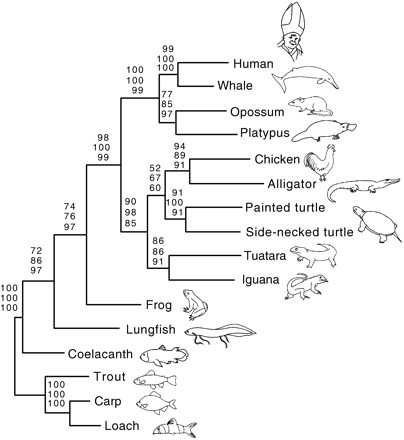The Reptile Database
 This database provides a catalogue of all living reptile species and their classification. The database covers all living snakes, lizards, turtles, amphisbaenians, tuataras, and crocodiles. Currently there are about 9,500 species including another 2,800 subspecies (statistics). The database focuses on taxonomic data, i.e. names and synonyms, distribution and type data and literature references. There is little other information in the database, such as ecological or behavioural information. The database has no commercial interest and therefore depends on contributions from volunteers. It is currently supported by the Systematics working group of the German Herpetological Society (DGHT) and a small grant from the European Union through the Catalogue of Life project.
This database provides a catalogue of all living reptile species and their classification. The database covers all living snakes, lizards, turtles, amphisbaenians, tuataras, and crocodiles. Currently there are about 9,500 species including another 2,800 subspecies (statistics). The database focuses on taxonomic data, i.e. names and synonyms, distribution and type data and literature references. There is little other information in the database, such as ecological or behavioural information. The database has no commercial interest and therefore depends on contributions from volunteers. It is currently supported by the Systematics working group of the German Herpetological Society (DGHT) and a small grant from the European Union through the Catalogue of Life project. What is a reptile?
Traditionally reptiles are lizards, snakes, turtles, and crocodiles as well as the less obvious groups of tuataras and amphisbaenians. These groups are also covered by this database. But strictly speaking, reptiles are not that easy to define. Phylogenetically reptiles are not an isolated evolutionary lineage like birds. In fact, crocodiles are more closely related to birds than to lizards, so the birds should be part of the reptile class as well. Or the crocodiles should be considered as birds! For a more detailed discussion check out the Tree of Life page on amniotes, the CNAAR page on vertebrate taxonomy, or the Wikipedia page on reptiles. By the way - this database and Wikipedia are quite heavily cross-referenced.
What is a reptile?
Traditionally reptiles are lizards, snakes, turtles, and crocodiles as well as the less obvious groups of tuataras and amphisbaenians. These groups are also covered by this database. But strictly speaking, reptiles are not that easy to define. Phylogenetically reptiles are not an isolated evolutionary lineage like birds. In fact, crocodiles are more closely related to birds than to lizards, so the birds should be part of the reptile class as well. Or the crocodiles should be considered as birds! For a more detailed discussion check out the Tree of Life page on amniotes, the CNAAR page on vertebrate taxonomy, or the Wikipedia page on reptiles. By the way - this database and Wikipedia are quite heavily cross-referenced.
" The database contains about 29,000 literature references, which are quite up-to-date. Most can be found under the individual species listings, with some general references to reptiles listed off the main page. There are links to other web resources for most species, providing access to the species' IUCN Red List status, additional pictures, and general information. This resource is aimed at serious herpetology researchers and could also be useful for beginning students in this discipline." ACRL Choice, July 2012. Recommended. Lower-division undergraduates through professionals.






















